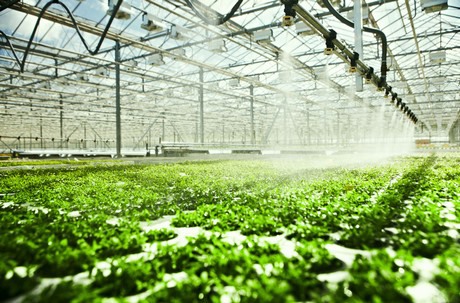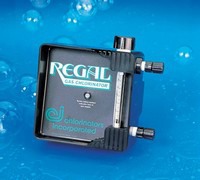"Prevention of pathogens on greenhouse vegetables & herbs is crucial. It is a proven fact that properly chlorinated irrigation water, washdown water, and equipment cleanup water provide a tremendous increase in product safety and shelf life, which translates into increased product salability and profitability." Speaking is Chris Myers with Regal Chlorinators. The company is a firm believer in the use of chlorinated irrigation water - and have reason to be so.

"Many decay and pathogen problems with herbs and vegetables are the result of ineffective sanitizing of the irrigation, washdown, and cleanup water. Bacteria can double every 20 minutes. A single bacterium can increase to 2 million in seven hours without water disinfection. If iron is a problem in water, chlorine can precipitate it and then be removed through filtration or other means", Chris explains.

"Gas chlorine does not increase pH levels in the system. However, sodium hypochlorite (bleach) and calcium hypochlorite (granular and tablets) do raise pH levels. An increase of pH reduces the germicidal effectiveness of chlorine, which is a crucial element in the disinfection process."
According to Chris, chlorine reacts with all organic compounds such as algae and slime, including bacteria cells that are present in water. "The most efficient, most effective, and safest way to chlorinate is by disinfecting the water with gas chlorine. Gas is the preferred form of chlorine for these applications, not only for its proven economies, but for its flexibility over other forms. Gas is safer and more reliable based on data provided by the American Association of Poison Control."
Chris explains how one of the benefits of gas chlorine is that it's always at 100% strength. "No matter how long it is in storage. In contrast, hypochlorites degrade and lose strength. Frequent adjustments to maintain consistent chlorine residual in the water are eliminated. Maintenance and upkeep of the gas feed system is minimal. It is delivered in rugged steel containers. There is no handling or mixing of the chemical itself in gas form. And gas chlorine is much less expensive than hyypochlorites. Because gas chlorine is pure, it does not add anything to the water. (e.g.: salt and calcium)."
For more information:
Regal Chlorinators
PH: 772-288-4854
FAX: 772-287-3238
regal@regalchlorinators.com
www.regalchlorinators.com
